Articles
- Page Path
- HOME > J Korean Acad Nurs > Volume 39(6); 2009 > Article
-
Original Article
- Critical Thinking Disposition and Clinical Competence in General Hospital Nurses
- Jin-Ah Park, Bog-Ja Kim
-
Journal of Korean Academy of Nursing 2009;39(6):840-850.
DOI: https://doi.org/10.4040/jkan.2009.39.6.840
Published online: December 31, 2009
1Head Nurse, Ewha Womans University Hospital, Seoul, Korea.
2Clinical Assistant Professor, Department of Clinical Nursing, College of Medicine, University of Ulsan, Seoul, Korea.
- Address reprint requests to: Kim, Bog-Ja. Department of Clinical Nursing, University of Ulsan, 388-1 Pungnap-dong, Songpa-gu, Seoul 138-736, Korea. Tel: 82-2-3010-5331, Fax: 82-2-3010-5332, bjkim@amc.seoul.kr
Copyright © 2009 Korean Society of Nursing Science
Abstract
-
Purpose
- This study was done to investigate the relationship between critical thinking disposition and clinical competence among nurses in general hospitals.
-
Methods
- This study was a descriptive-correlational study with a convenience sample of 560 nurses from 5 general hospitals. The data were collected by self-administered questionnaires. Critical thinking disposition was measured using the Critical Thinking Disposition Scale for Nursing Students. Clinical competence was measured using the Standardized Nurse Performance Appraisal Tool.
-
Results
- The mean score for critical thinking disposition and clinical competence was 3.37 and 4.10 respectively on a 5 point scale. A statistically significant correlation was found between critical thinking disposition and clinical competence. A regression model explained 72.8% of clinical competence. Prudence is the most significant predictor of clinical competence (R2=.728).
-
Conclusion
- Study findings suggest that nurses with a higher level of critical thinking disposition would have a higher level of clinical competence. Furthermore, prudence might be the most important predictor of clinical competence. In order to strengthen clinical competence in nurses, the development and enhancement of critical thinking should be emphasized at the college level and nurses should be encouraged to make a clinical decision with greater prudence.
- 1. American Philosophical Association. "The Delphi Report", Committee on Pre-college Philosophy (ERIC Document Reproduction Service No. ED 315 423). Critical Thinking: A statement of expert consensus for purposes of educational assessment and instruction. 1990;Newark, DE, Author.
- 2. Brunt BA. Critical thinking in nursing: An integrated review. The Journal of Continuing Education in Nursing. 2005;36(2):60–67.ArticlePubMed
- 3. Chang YH, Cho YS, Kwak MJ. A study of factor related nursing competency in nurses. Clinical Nursing Research. 2006;12:7–19.
- 4. Cho HS. A study on the critical thinking disposition and clinical competency of nursing students. Journal of Korean Academic Society of Nursing Education. 2005;11:222–231.
- 5. Facione NC, Facione PA, Sanchez CA. Critical thinking disposition as a measure of competent clinical judgment: The development of the California critical thinking disposition inventory. Journal of Nursing Education. 1994;33:345–350.ArticlePubMed
- 6. Hwang JW. A study on the relationships between critical thinking disposition and professional nursing competence. 1998;Seoul, Ewha Womans University. Unpublished master's thesis.
- 7. Jang KS. A study on establishment of clinical career development model of nurses. 2000;Seoul, Yonsei University. Unpublished doctoral dissertation.
- 8. Jeon YS. A study on multiple sources in the nurse performance appraisal. 2007;Jeonju, Chonbuk National University. Unpublished master's thesis.
- 9. Jung DY. A study on the critical thinking disposition and critical thinking skill about student nurse. 2001;Seoul, Ewha Womans University. Unpublished master's thesis.
- 10. Kim JL. A study on the relationships between critical thinking disposition and job satisfaction. 2007;Seoul, Kyunghee University. Unpublished master's thesis.
- 11. Kim SY. A study of professional self-concept, critical thinking disposition and nursing performance of operating room nurses. 2003;Seoul, Korea University. Unpublished master's thesis.
- 12. Ko KJ. A study on the critical thinking disposition and clinical competency of nursing students. 2003;Gangneung, Kwandong University. Unpublished master's thesis.
- 13. Kwon IS, Lee GE, Kim GD, Kim YH, Park KM, Park HS, et al. Development of a critical thinking disposition scale for nursing students. Journal of Korean Academy of Nursing. 2006;36:950–958.ArticlePubMedPDF
- 14. Lee HJ. A study on critical thinking disposition and empowerment of clinical nurses. 2002;Seoul, Kyunghee University. Unpublished master's thesis.
- 15. Lee MJ. A study on factor related to clinical competency in nurse. 2002;Seoul, Yonsei University. Unpublished master's thesis.
- 16. Martin C. The theory of critical thinking of nursing. Nursing Education Perspectives. 2002;23:243–247.PubMed
- 17. May BA, Edell B, Butell S, Doughty J, Langford C. Critical thinking and clinical competence: A study of their relationship in BSN. Journal of Nursing Education. 1999;38:100–110.PubMed
- 18. Maynard CA. Relationship of critical thinking ability to professional nursing competence. Journal of Nursing Education. 1996;35:12–18.ArticlePubMed
- 19. Park JS. Critical thinking disposition of preceptor nurse and professional nursing competence of new graduate nurse. 2008;Suwon, Ajou University. Unpublished master's thesis.
- 20. Park SA, Park KO, Kim SY, Sung YH. A development of standardized nurse performance appraisal tool. Clinical Nursing Research. 2007;13:197–211.
- 21. Park SM, Kwon IK. Factor influencing nurses' clinical decision making-Focusing on critical thinking disposition. Journal of Korean Academy of Nursing. 2007;37:863–871.PubMed
- 22. Profetto-McGrath J. The relationship of critical thinking skills and critical thinking dispositions of baccalaureate nursing students. Journal of Advanced Nursing. 2003;43:569–577.ArticlePubMedPDF
- 23. Rane-Szostak D, Robertson JF. Issue in measuring critical thinking: Meeting the challenge. Journal of Nursing Education. 1996;35:5–11.PubMed
- 24. Shin KR, Ha JY, Kim KH. A longitudinal study of critical thinking dispositions and critical thinking skills in baccalaureate nursing students. Journal of Korean Academy of Nursing. 2005;35:382–389.PubMed
- 25. Shin KR, Kang MJ, Ko JK, Kong BH, Kim SL, Park IS, et al. Critical thinking and nursing process. 2007;Seoul, Hyunmoonsa.
- 26. Simpson E, Courtney M. Critical thinking in nursing education: Literature review. International Journal of Nursing Practice. 2002;8:89–98.ArticlePubMed
- 27. Zhang ZX, Luk W, Arthur D, Wong T. Nursing competencies: Personal characteristics contributing to effective nursing performance. Journal of Advanced Nursing. 2001;33:467–474.ArticlePubMed
REFERENCES
Figure & Data
REFERENCES
Citations

- In teaching youths to learn critically: the role of family, formal and non-formal education – findings from a middle-income context
Le Anh Vinh, Hoang Phuong Hanh, Bui Dieu Quynh, Trinh Thi Ngoc Lan, Bui Thi Dien, Do Duc Lan, Luong Viet Thai
Asia Pacific Journal of Education.2025; 45(1): 84. CrossRef - The effect of a 10‐week field‐oriented transition programme for new graduate registered nurses in critical care
Hana Kim, Eunhye Kim, Jamin Noh, Eunkyung Bang, Sunghee H. Tak
Nursing in Critical Care.2025;[Epub] CrossRef - Development and Impacts of an AI Tutor for Nursing Students: Emphasizing on Clinical Practice Education
Min-Kweon Ahn, Min-Jeong Chae
Journal of Digital Contents Society.2025; 26(5): 1285. CrossRef - Nursing students’ satisfaction and clinical competence by type of pediatric nursing practicum during the COVID-19 pandemic
Hyeon Ok Ju, Jung Hwa Lee
The Journal of Korean Academic Society of Nursing Education.2024; 30(1): 29. CrossRef - Association between Nurses’ Perceptions of Patient Safety Culture, Willingness to Report Near Misses, Critical Thinking Disposition, and Nursing Care Activities for Patient Safety
Da Eun Lee, Bo Gyeong Lee
Journal of Korean Academy of Nursing Administration.2024; 30(3): 283. CrossRef - THE LEVEL OF NURSES' CLINICAL COMPETENCE WITH BACHELOR'S AND MASTER'S DEGREES WORKING IN URMIA HOSPITALS IN 2024
Yusef Haghighimoghadam, Zahraalsadat Abedi, Farshad Mohammadi, Vahid Alinejad
Nursing and Midwifery Journal.2024; 22(6): 486. CrossRef - Exploring the link of personality traits and tutors’ instruction on critical thinking disposition: a cross-sectional study among Chinese medical graduate students
LingYing Wang, WenLing Chang, HaiTao Tang, WenBo He, Yan Wu
BMJ Open.2024; 14(8): e082461. CrossRef - Factors affecting the development of clinical nurses’ competency: A systematic review
Abdulaziz Mofdy Almarwani, Naif S. Alzahrani
Nurse Education in Practice.2023; 73: 103826. CrossRef - Chinese version of Yoon Critical Thinking Disposition Instrument: validation using classical test theory and Rasch analysis
Mio Leng Au, Yue Yi Li, Lai Kun Tong, Si Chen Wang, Wai I Ng
BMC Nursing.2023;[Epub] CrossRef - Correlation between moral distress and clinical competence in COVID-19 ICU nurses
Zohreh Kalani, Maasoumeh Barkhordari-Sharifabad, Niloufar Chehelmard
BMC Nursing.2023;[Epub] CrossRef - Effects on Triage Competency Based on Nursing Task Performance and Self-Efficacy of Nurses in Regional Emergency Medical Institutions
Su Jin Kim, Su Ol Kim
Korean Journal of Adult Nursing.2022; 34(3): 304. CrossRef - Grafik Tasarımı Bölümü Öğrenme Çıktılarının 21. Yüzyıl Becerileri Temelinde İncelenmesi
Aytaç ÖZMUTLU, Emel BAYRAK ÖZMUTLU
Güzel Sanatlar Enstitüsü Dergisi.2021; 27(46): 138. CrossRef - Is nurses’ clinical competence associated with their compassion satisfaction, burnout and secondary traumatic stress? A cross‐sectional study
Mohammad Ali Zakeri, Gholamreza Bazmandegan, Hamid Ganjeh, Maryam Zakeri, Sekineh Mollaahmadi, Ali Anbariyan, Zahra Kamiab
Nursing Open.2021; 8(1): 354. CrossRef - Chinese medical students’ disposition for critical thinking: a mixed methods exploration
Lei Huang, Angela Pei-Chen Fan, Na Su, Jessica Thai, Russell Olive Kosik, Xudong Zhao
BMC Medical Education.2021;[Epub] CrossRef - Critical Thinking Level among Medical Sciences Students in Iran
Faranak Jafari, Seyyed Mohsen Azizi, Ali Soroush, Alireza Khatony, Ahmed Rachid
Education Research International.2020; 2020: 1. CrossRef - Influences of Critical Thinking Disposition, Nurse Managers' Transformation and Transactional Leadership Style on Nurses' Competency with Evidence Based Practice
Geum Ah Lee, Sung Hee Shin, Suk Jeong Ko
Journal of Korean Academy of Nursing Administration.2020; 26(4): 305. CrossRef - FACTORS INFLUENCING COMPETENCY DEVELOPMENT OF NURSES AS PERCEIVED BY STAKEHOLDERS IN VIETNAM
Do Thi Ha, Khanitta Nuntaboot
Belitung Nursing Journal.2020; 6(4): 103. CrossRef - Development and Validation of the Student-Educator Negotiated Critical Thinking Dispositions Scale (SENCTDS)
Sarah Quinn, Michael Hogan, Christopher Dwyer, Patrick Finn, Emer Fogarty
Thinking Skills and Creativity.2020; 38: 100710. CrossRef - Effect of a Situational Module Learning Course on Critical Thinking Disposition and Metacognition in Nursing Students: A Quasi-experimental Study
Kwang Ok Park, Mi Yu
Journal of Korean Academic Society of Nursing Education.2019; 25(2): 251. CrossRef - General Self-Efficacy Mediates the Effect of Family Socioeconomic Status on Critical Thinking in Chinese Medical Students
Lei Huang, Yun-Lin Liang, Jiao-Jiao Hou, Jessica Thai, Yu-Jia Huang, Jia-Xuan Li, Ying Zeng, Xu-Dong Zhao
Frontiers in Psychology.2019;[Epub] CrossRef - The influence of informal learning and learning transfer on nurses' clinical performance: A descriptive cross-sectional study
Jungmi Yun, Dong-Hee Kim, Youngchoon Park
Nurse Education Today.2019; 80: 85. CrossRef - The Association of Competence and Critical Thinking in the Nurses in Imam Khomeini Hospital, Affiliated to Tehran University of Medical Sciences, Iran
H Jafari, T Taghavi Larijani, F Ghadirian, HS Emamzadeh Ghasemi
Iran Journal of Nursing.2019; 32(121): 28. CrossRef - The Competence Screening Questionnaire for Higher Education: Adaptable to the needs of a study programme
Evelyn Bergsmann, Julia Klug, Christoph Burger, Nora Först, Christiane Spiel
Assessment & Evaluation in Higher Education.2018; 43(4): 537. CrossRef - Critical Thinking, Stress of Clinical Practice and Competence of Clinical Practice of the Nursing Students
Gyoo-Yeong CHO
JOURNAL OF FISHRIES AND MARINE SCIENCES EDUCATION.2018; 30(4): 1223. CrossRef - Effects of Nursing Practice Environment and Self-esteem on Critical Thinking Disposition among Clinical Nurses
Eunju Choi, Jihyeon Hwang, Insil Jang
Journal of Korean Academy of Nursing Administration.2017; 23(2): 161. CrossRef - Effects of Moral Sensitivity and Critical Thinking Disposition on Perceived Ethical Confidence in Nursing Students
Mi-Hye Lim
Journal of the Korea Academia-Industrial cooperation Society.2016; 17(9): 610. CrossRef - A Study on the Critical Thinking Disposition, Self-directed Learning Readiness and Professional Nursing Competency
An-Na Park, Kyung-Hee Chung, Weon Gyeong Kim
Journal of Korean Academy of Nursing Administration.2016; 22(1): 1. CrossRef - Effects of SBAR Program on Communication Clarity, Clinical Competence and Self-efficacy for Nurses in Cancer Hospitals
Youn Hwa Kim, Yooun Sook Choi, Hye Young Jun, Myung Ja Kim
The Korean Journal of Rehabilitation Nursing.2016; 19(1): 20. CrossRef - The Experiences of Students Transferring into the Nursing Program at Local Universities
Moon-Jeong KIM, So-Hee KIM, Eun-Kyung BYUN
Journal of Fisheries and Marine Sciences Education.2016; 28(2): 366. CrossRef - The relationship among critical thinking disposition, nursing process competency and evidence-based practice competency in nurses working in hospitals
Kyoung Yun Kim, Eunjoo Lee
Journal of the Korean Data and Information Science Society.2016; 27(2): 451. CrossRef - A Design for and Evaluation of a Critical Thinking Class for New Community Health Practitioners
Ji Yeon Park, MinGyu Seo, Hyoung Suk Kim, Kyung Hee Yoo, Kyung Ja June
The Journal of Korean Academic Society of Nursing Education.2015; 21(1): 141. CrossRef - A Study on Interpersonal Relation Disposition, Critical Thinking Disposition, and Communication Competence in Undergraduate Students in Nursing
Narae Heo
Journal of Korean Academy of Psychiatric and Mental Health Nursing.2015; 24(1): 22. CrossRef - Evaluation of tools used to measure critical thinking development in nursing and midwifery undergraduate students: A systematic review
Amanda G. Carter, Debra K. Creedy, Mary Sidebotham
Nurse Education Today.2015; 35(7): 864. CrossRef - Exploring the association between parental rearing styles and medical students’ critical thinking disposition in China
Lei Huang, Zhaoxin Wang, Yuhong Yao, Chang Shan, Haojie Wang, Mengyi Zhu, Yuan Lu, Pengfei Sun, Xudong Zhao
BMC Medical Education.2015;[Epub] CrossRef - Professional Quality of Life and Clinical Competencies among Korean Nurses
Kyunghee Kim, Yonghee Han, Yeunhee Kwak, Ji-su Kim
Asian Nursing Research.2015; 9(3): 200. CrossRef - The Knowledge, Need, and Usage of Medical Terminology in Clinical Nursing Practice
Gisoo Shin, Mi-Kyoung Cho
Journal of Korean Biological Nursing Science.2014; 16(4): 276. CrossRef - Accuracy and Satisfaction with IVIC300 (Intravenous infusion controller)
Jung Hee Park, Nam Young Yang, Moon Jun Na, Young Jin Go, Ki Suk Kim, Young Aue Kim
Journal of Korean Public Health Nursing.2014; 28(1): 114. CrossRef - Development of Nursing Competence Scale for Graduating Nursing Students
Ga Eul Joo, Kyeong-Yae Sohng
Journal of Korean Public Health Nursing.2014; 28(3): 590. CrossRef - Clinical Competence according to Experiences on the Essential of Fundamental Nursing Skills in Nursing Students
Dongwon Choi
The Journal of Korean Academic Society of Nursing Education.2014; 20(2): 184. CrossRef - Clinical Reasoning Ability of Oncology Nurses
Eun Young Park
Asian Oncology Nursing.2014; 14(4): 265. CrossRef - Use of the 5E Learning Cycle Model Combined With Problem-Based Learning for a Fundamentals of Nursing Course
Won Hee Jun, Eun Ju Lee, Han Jong Park, Ae Kyung Chang, Mi Ja Kim
Journal of Nursing Education.2013; 52(12): 681. CrossRef - Factors Influencing Evidence-Based Practice Readiness for Tertiary General Hospital Nurses
Jeong-Sook Kim, Mee-Ock Gu, Sun-Yon Jo
Journal of the Korea Academia-Industrial cooperation Society.2013; 14(6): 2945. CrossRef - Effects of Self-leadership and Job Involvement on Clinical Competence in General Hospital Nurses
Yonghee Han, Youngrye Park
Journal of Korean Academy of Nursing Administration.2013; 19(4): 462. CrossRef - Professional Self-Concept, Critical Thinking Disposition and Clinical Competence in Nursing Students
Kyung-Ah Shin, Bok-Hee Cho
Journal of Korean Academy of Fundamentals of Nursing.2012; 19(1): 46. CrossRef - Perceived Relationship among Professional Self-Concept, Head Nurse's Leadership, and Nursing Clinical Competency by Clinical Nurses
Young-Jin Kim, Hyun-Kyoung Song, Mi-Aie Lee
Journal of Korean Academy of Nursing Administration.2011; 17(1): 96. CrossRef - Factors Influencing Clinical Competence for General Hospital Nurses
Kyung-Ja Kang, Eun-Man Kim, Se-Ang Ryu
The Journal of the Korea Contents Association.2011; 11(1): 284. CrossRef - Critical thinking disposition, stress of clinical practice and clinical competence of nursing students
In-Sook Kim, Youn-Kyoung Jang, Su-Ho Park, So-Hyeon Song
The Journal of Korean Academic Society of Nursing Education.2011; 17(3): 337. CrossRef - Development and Evaluation of a Patient Safety-focused Inservice Education Program for Surgical Nurse
Young Mee Kim, Myung Sook You, Yaun Hee Cho, Seung Hae Park, Seung Nam Nam, Mi Ok Park, Se Young Kim, Min Young Kim
Journal of Korean Academy of Nursing Administration.2010; 16(2): 152. CrossRef
General Characteristics of Subjects (N=560)
*Missing data excluded; †Critical thinking education; ‡Multiple response.
Critical Thinking Disposition (N=560)
Critical Thinking Disposition by General Characteristics (N=560)
*Critical thinking education.
Clinical Competence by General Characteristics (N=560)
*Critical thinking education.
Correlations between Critical Thinking Disposition and Clinical Competence (N=560)
**p<.001.
Predictors of Clinical Competence
**p<.001; †Dummy coded (0=Medical, 1=OB&GY).
*Missing data excluded; †Critical thinking education; ‡Multiple response.
*Critical thinking education.
*Critical thinking education.
**
**
 KSNS
KSNS
 E-SUBMISSION
E-SUBMISSION
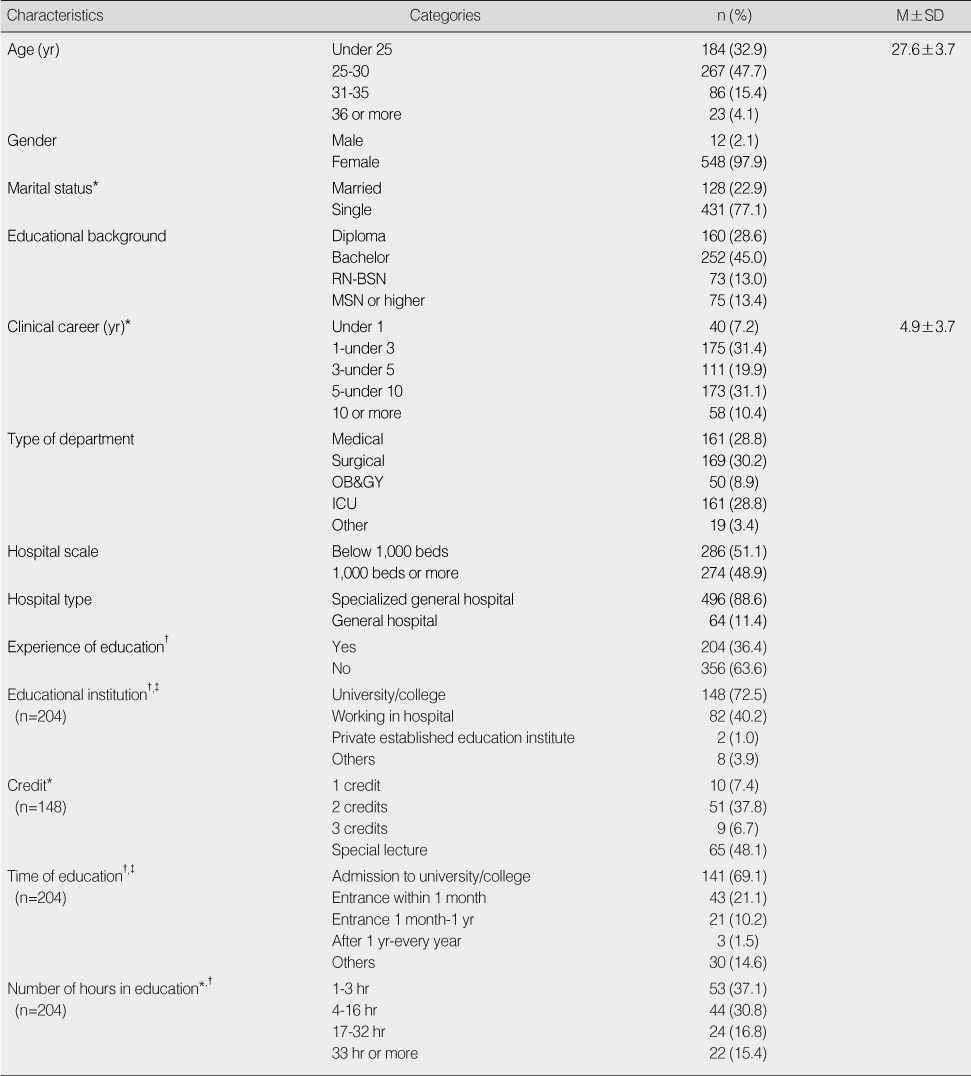
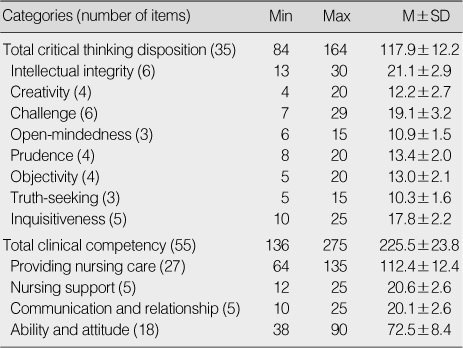
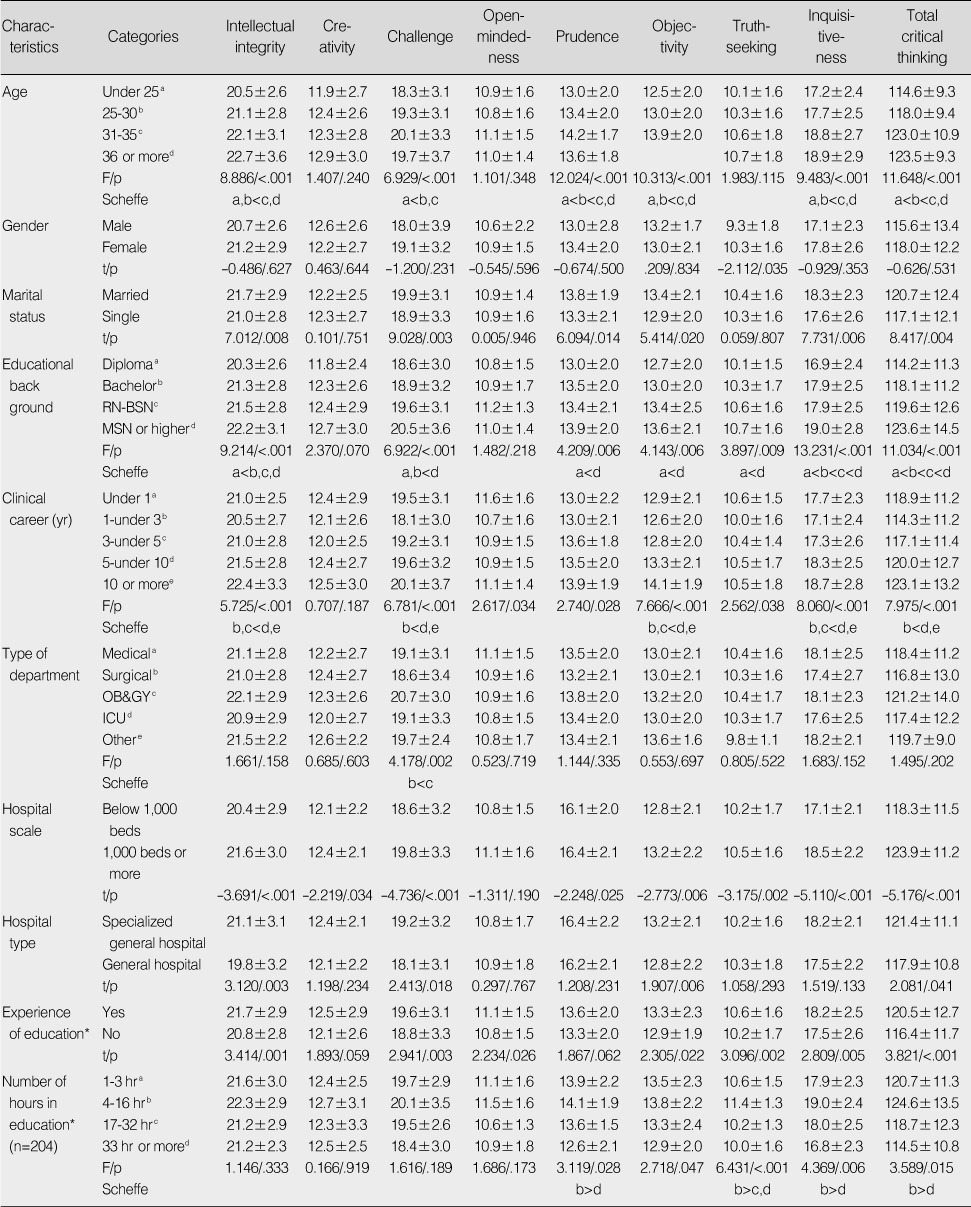
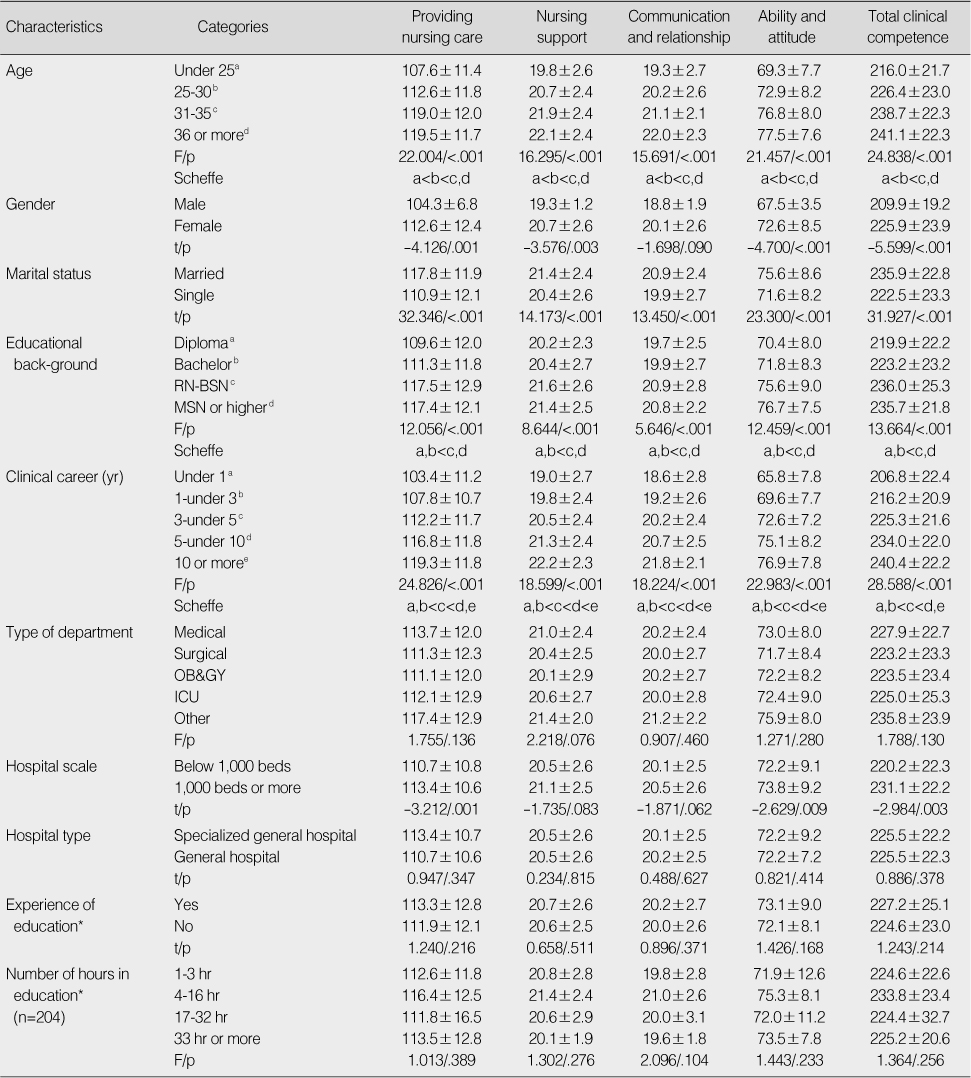
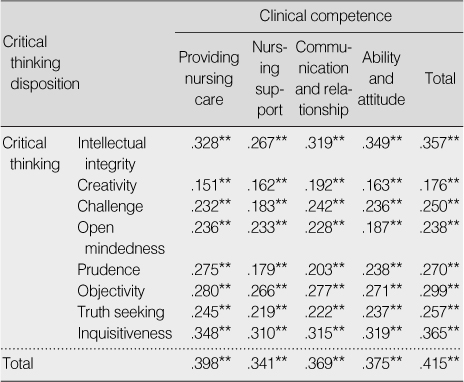
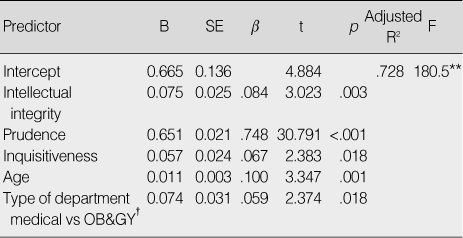
 Cite
Cite

